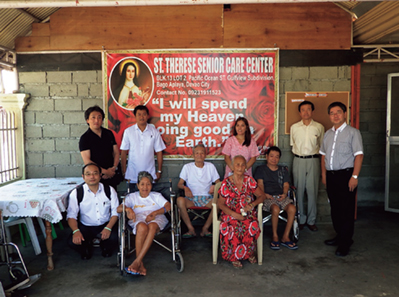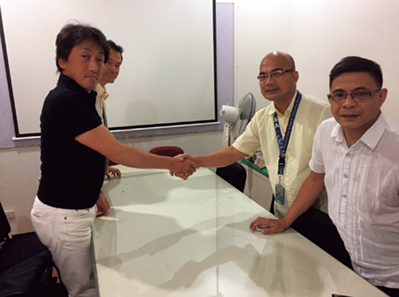Master Techniques from Japan to the World 3
Expanding a Nursing-Care Service for Self-Support in the Philippines
– The Introduction of the Japanese Style Nursing-Care System that Stays Close to the Elderly
Since 2012, the Philippines has shown significant growth even compared to other leading ASEAN countries. With a population exceeding 100 million people and an average age of 23 (according to a 2014 survey), the young labor force is pushing economic development. On the other hand, the healthy life expectancy.*1 is being extended due to the declining birthrate and medical advancements. Therefore, the Philippines is also faced with a need to prepare for an aging society and the increase in so-called nursing-care refugees (those unable to receive nursing care at home or facilities such as hospitals and nursing homes

A private group home for the elderly in Davao City, Mindanao(Photo: INFIC Inc.)
However, with a shortage in medical and nursing care personnel in the country and the spread of the nuclear family in urban areas, there are cases where it is difficult for the elderly to receive nursing care at home. As the government has not established clear operational standard on staffing and facilities for nursing care, unauthorized private nursing care facilities are rapidly increasing while facility sanitation and operational quality remain poor. As a result, proper nursing care is not being provided.
Mr. Masatoshi Masuda, CEO of INFIC Inc., a company that provides comprehensive nursing care support located in Shizuoka City, is analyzing such a situation surrounding nursing care in the Philippines. Aiming to enable the “nursing-care service for self-support” developed by his company and the high quality nursing care services of Japan to take root in the Philippines, he implemented the “Promotion Survey for Introducing Japanese Style Nursing-Care System” in 2016 under the JICA program for Support for Japanese Small and Medium-sized Enterprises (SMEs) Overseas Business Development, which went on to a feasibility survey in October 2017. While the original plan was to construct a large-scale nursing-care facility, he instead chose to leverage the culture of the Philippines that values family ties and address cost issues by introducing a small-scale multi-function home nursing service. This program tries to introduce a framework comprised of three services including commuting to small scale nursing care facilities (day service), home-visit nursing care and short stay, combined with an IoT system*2 that INFIC developed, in a form that fits the Philippines. Filipinos will also be hired and trained to work as facility staff. This will support each elderly person to live in a manner that fits their personality in a place they are familiar with. Success of this project is expected to lead to the creation of nursing jobs while preventing the emigration of prime talented medical and nursing professionals to overseas job markets.

Requesting research on the problems in policy for the elderly in the Philippines and the potential for the Japanese style nursing care to representatives of the University of St. La Salle (Mr. Masuda is on the left) (Photo: INFIC Inc.)
Mr. Masuda explains, “Outside Japan, the concept of nursing care is different in the sense that it is considered synonymous with medical treatment, and they will not find hospitable nursing care for the elderly as provided in Japan. Also, we hear of complaints from users who want to know why everything is not provided for them even though they pay for it, which is the very opposite of the Japanese style nursing-care system in which care is provided to enable the elderly to be self-sufficient by only assisting what they cannot do themselves.” In order for the Filipinos to welcome the Japanese style nursing care which emphasizes the rehabilitation of daily life and hospitality on the part of care givers, Mr. Masuda believes it is necessary to encourage the government and local communities to understand that “nursing care aiming to support independence” contributes not only to a reduction in medical and nursing care costs, but also to protection of the dignity of the elderly and support for longer and healthier lives.
Mr. Masuda describes his hope to spread the Japanese style nursing care approach, saying “I think the most important thing at first is to contribute to the Philippines through 'nursing-care for self-support.' After we establish a nursing care system through this project, we intend to establish 10 bases in the Philippines within five years. And ultimately, we hope to spread the Japanese style nursing-care system primarily among ASEAN countries in order to contribute to the countries of Asia.”
*1 The healthy life expectancy in the Philippines, or the number of years during which individuals have no health issues in daily life, is 61.1 years of age. The average for 183 countries throughout the world is 63.1 years of age. Japan has the highest age at 74.9 years.
*2 IoT is the abbreviation for Internet of Things. It describes a system in which things exchange information via the Internet for mutual control. The daily life support IoT equipment developed by INFIC generates data from the daily lives and activities of the elderly using sensors installed in the home for management, storage, and analysis in the cloud for use in an elderly monitoring system.
<< Previous Page Next Page >>
Main Text | Statistics and Reference Materials | Stories from the Field | Master Techniques from Japan to the World | ODA Topics
